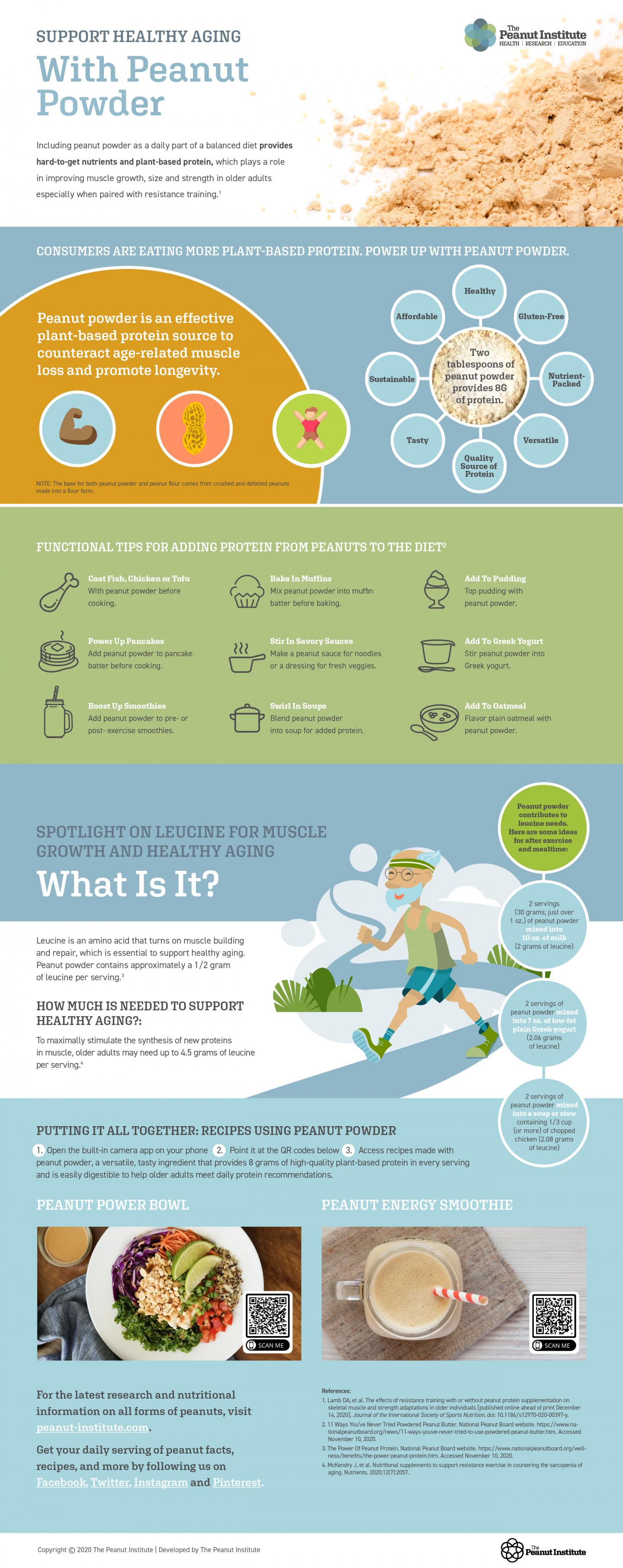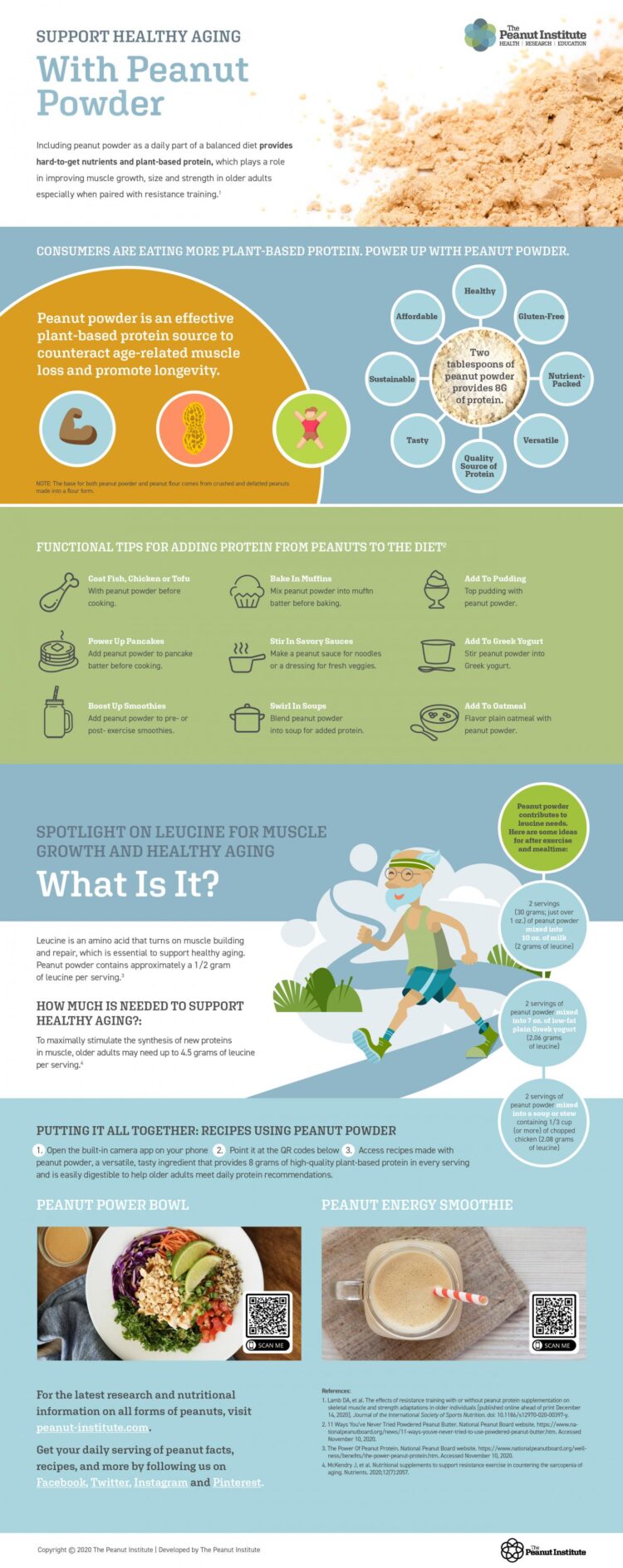
Credit: © 2020 The Peanut Institute
Declines in muscle mass and strength can begin in early adulthood, unnoticeable at first, and eventually progress until functionality, endurance, and general health may be compromised. Evidence-based and cost-effective lifestyle interventions, such as resistance training (RT) and ensuring optimal dietary protein intake, aim to increase muscle mass in older individuals, and support healthy aging and longevity.
Now, as the popularity and consumer demand for plant-based protein to support exercise training grows, the full array of essential and non-essential amino acids and high protein digestibility of defatted peanut protein powder (PP) makes it an exceptional plant-based protein option. Yet, no studies to date have examined if PP combined with RT can enhance training adaptations and measures of muscle mass, function and strength, especially in an older population. For the first time, a randomized controlled clinical trial from researchers at Auburn University published in the Journal of the International Society of Sports Nutrition demonstrates that in combination with RT, intake of PP positively affects select markers of muscle growth and strength among untrained, older adults.
“Many of the previous studies in this space have looked at how animal-based or soy protein-based supplements enhance the response to resistance training,” says Dr. Roberts, PhD, a co-principal investigator on the study from Auburn University in the School of Kinesiology. “This study suggests that pairing resistance training with supplemental peanut powder may be an effective plant-based protein solution to meet protein needs and perhaps slow or prevent age-related loss of muscle in older adults.”
Thirty-nine older, untrained individuals completed a six-week or ten-week supervised RT program, where full-body training was implemented twice weekly. Participants were also randomly assigned to consume either a PP supplement mixed with 16 fl. oz. of water once per day (75 total grams of powder providing 30 grams protein, >9.2 grams of essential amino acids, ~315 calories) or be a “wait-list” control who did not receive any supplement (CTL). On workout days, PP supplements were provided immediately following exercise and compliance was monitored by trained study personnel. Skeletal muscle biopsies and other markers of muscle quality, body composition and strength, as well as three-day self-reported habitual food intake, were collected.
PP supplementation significantly increased knee flexion peak torque – a marker of muscle strength – in the ten-week cohort relative to the CTL group. In looking at the combined data from both the six- and ten-week groups, PP participants experienced significant increases in vastus lateralis (VL) thickness – a measure of muscle growth – compared to CTL participants. Notably, the consumption of protein and fiber significantly increased during the study in the PP group compared to CTL. This is attributed to the ~15 grams per day of fiber and 30 grams per day of protein received from the nutritional supplement. Surprisingly, PP supplementation after one bout of resistance exercise did not enhance muscle protein synthesis rates within a 24-hour period following the first training bout. Body composition was not different between the PP and CTL groups.
“There is strong evidence to suggest protein needs, specifically, the intake of more essential amino acids, increase with age due to many factors,” added co-principal investigator, Drew Frugé, PhD, RD, with the Department of Nutrition, Dietetics and Hospitality Management at Auburn University. “The protein isolated from peanuts contains a full complement of essential amino acids, including the important muscle growth ‘switch’ leucine, that can be delivered in a nutrient-dense package with the functional benefit of being simply incorporated into many easy to consume and tasty food or beverage preparations that meet the dietary needs of older adults.”
This study followed a rigorous methodology by using a randomized design in a laboratory setting and supervising participant training, as well as PP supplement compliance. However, the researchers noted a few limitations, mainly the duration of the intervention of the second cohort. As the original intent was to recruit two separate ten-week cohorts, due to the SARS-CoV-2 pandemic, the researchers voluntarily decided to end the second cohort after only six weeks of training to maintain the health and safety of the participants. The decision to compare PP supplementation to no supplementation was made to establish more “real world” relevance (i.e., people supplement their diets with protein powder, or nothing at all).
Despite such limitations, the researchers concluded that “…peanut protein powder supplementation with 6-10 weeks of resistance training enhance certain aspects of muscle hypertrophy and strength in older adults, compared to a resistance training program alone in the elderly population.” Future studies that are longer in duration are needed to definitively determine if PP supplementation can enhance hypertrophic adaptations with resistance training.
###
The article, “The effects of resistance training with or without peanut protein supplementation on skeletal muscle and strength adaptations in older individuals,” is published in Journal of the International Society of Sports Nutrition (doi: https:/
Andrew D. Frugé, PhD, and Michael D. Roberts, PhD, of Auburn University are co-principal investigators. Kevin Huggins, PhD, of Auburn University and Kaelin Young, PhD, from the Edward Via College of Osteopathic Medicine, are co-Investigators. This study was made possible by a grant provided by The Peanut Institute Foundation.
For more information, visit: https:/
Media Contact
Related Journal Article
http://dx.





